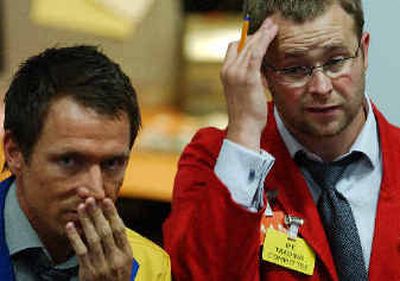British truckers threaten strikes if fuel tax goes up

LONDON – As rising oil prices pushed gasoline past $5.79 per gallon in Britain, truck drivers threatened strikes and cabbies filling up at the pumps complained about working extra hours to make ends meet.
“You can’t do nothing about it, can you mate, given what’s going on in the Middle East,” said James Sullivan, 50, a driver of one of Britain’s traditional black cabs. “I make less money, because I can’t pass the increase on to my fares, can I?”
Another cabbie who pulled in behind him Wednesday at the Texaco station in central London said, “I’m already working about an hour extra a day to make up what I’m losing in higher gas prices.”
But Gary Hutchinson, 43, also said the price is worth paying.
“I believe the oil price increases are a direct result of the Iraq war,” he said. “But we went in there to free the Iraqis, and we all have to pay a price for freedom.”
Waving a receipt showing he had just paid $94 to fill up his small van with diesel fuel, 21-year-old Ian Wheatley said: “Can’t we buy gas off you over in America? Aren’t we (President) Bush’s biggest ally?”
Gas prices in the United States have risen well past $2 a gallon, as oil prices have surged – reflecting the petroleum industry’s anxiety that terrorists might disrupt oil supplies.
In Britain, the Automobile Association said the average cost of unleaded gasoline was about $5.79 a gallon Wednesday, an increase of 14 cents from Tuesday.
But some filling stations were charging more than $6.31 per gallon for unleaded fuel and one, Total Gas in west London, was selling super unleaded for $7.93.
One taxi driver who filled up at that station nearly gagged over the bill.
“This is appalling,” said Paul Keogh, 35. “I wouldn’t normally ever come to this petrol station, but I have to get to the airport and there isn’t another station nearby.”
Luke Bosdet, an Automobile Association spokesman, said: “Gas prices are reaching a point where British motorists are getting frustrated and worried about how high they will go.”
That frustration was obvious with the Road Haulage Association, a trade group representing about 12,000 truck companies and 100,000 drivers in Britain.
Its spokesman, Steve Williams, said everyone knows the main reason Britons pay such steep gas prices is the government’s high fuel taxes.
Britain’s fuel taxes account for nearly three-quarters of the cost of gasoline and are among Europe’s highest. The level of fuel duty for gasoline is currently $3.30 per gallon.
Williams warned that if Treasury chief Gordon Brown carries out his plan to raise taxes by another 4 cents in September, he’ll regret his decision.
“The UK-based truck drivers have decided enough is enough,” Williams said. “If the government continues to ignore our plight, and fails to suspend the planned fuel tax increase, there will be a lot of strikes and militant action.”
In 2000, the association joined a national protest by motorists and truck drivers angry that British gasoline prices were the highest in Europe. Protesters blockaded refineries and fuel depots, all but paralyzing the country for about a week.
Sue Nicholson, an official with the Royal Automobile Club, said on Wednesday, “It was inevitable after the events in Saudi Arabia that prices would go up… . However, higher prices will impinge on everyone and particularly the less well-off motorists.”
The RAC and the Automobile Association opposed new protests but urged Brown to cancel his planned fuel tax increase. Brown has urged OPEC to increase production to reduce oil prices, but the government said Wednesday the Treasury chief would go ahead with the tax increase.